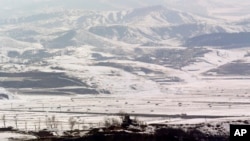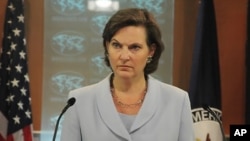International support is mounting for the United Nations to conduct a formal investigation into the human rights situation in North Korea, where conditions are believed to be among the worst in the world.
The United States on Thursday said it would support a U.N. probe into what State Department spokesperson called the "deplorable" human rights condition in the secretive communist state.
"We do support the establishment of enhanced mechanisms of inquiry into the DPRK's human rights violations at the U.N. Human Rights Council upcoming session," she said.
The U.S. Senate Foreign Relations Committee on Thursday also adopted legislation calling for support of the investigation, with lawmakers warning that North Korea is in a "class by itself" in terms of human rights abuses.
U.N. human rights chief Navi Pillay last month called for an international inquiry into the situation of what she described as North Korea's "beleaguered, subjugated population." She said the situation has shown almost no sign of improvement under new leader Kim Jong Un.
Japan and several European Union diplomats have already signaled support for the inquiry.
Greg Scarlatiou, who heads the U.S.-based Committee for Human Rights in North Korea, tells VOA this reflects a growing trend of global support for holding Pyongyang accountable for its human rights abuses.
"For the past few years, votes in favor of the United Nations General Assembly addressing the North Korean human rights situation have been on the increase, while votes against such resolutions or abstentions have been on the decrease," he said.
Scarlatiou says there is also more willingness to address North Korean human rights partly because Russia and China have rotated out of the human rights council.
Efforts to address the issue have been complicated because U.N. rights officials and other human rights groups are not allowed access to North Korea. But Scarlatiou says that is changing.
"What has changed is that there have been numerous North Koreans leaving the country since a great famine hit North Korea in the 1990s," says Scarlatiou. "They have provided valuable testimony, valuable evidence, to the extent that the U.N. High Commission [on Human Rights] was persuaded."
Scarlatiou says a U.N. commission of inquiry, which would be made up of independent experts and scholars, would help by "shedding light" and publishing facts on the "abysmal" situation in North Korea. He says as many as 200,000 people are being held in North Korean prison camps, where torture, rape and slave labor have been reported.
North Korea has rejected the charges, saying they are politically-motivated attempts to smear its reputation.
Some information for this report was provided by AP and AFP.
The United States on Thursday said it would support a U.N. probe into what State Department spokesperson called the "deplorable" human rights condition in the secretive communist state.
"We do support the establishment of enhanced mechanisms of inquiry into the DPRK's human rights violations at the U.N. Human Rights Council upcoming session," she said.
The U.S. Senate Foreign Relations Committee on Thursday also adopted legislation calling for support of the investigation, with lawmakers warning that North Korea is in a "class by itself" in terms of human rights abuses.
U.N. human rights chief Navi Pillay last month called for an international inquiry into the situation of what she described as North Korea's "beleaguered, subjugated population." She said the situation has shown almost no sign of improvement under new leader Kim Jong Un.
Japan and several European Union diplomats have already signaled support for the inquiry.
Greg Scarlatiou, who heads the U.S.-based Committee for Human Rights in North Korea, tells VOA this reflects a growing trend of global support for holding Pyongyang accountable for its human rights abuses.
"For the past few years, votes in favor of the United Nations General Assembly addressing the North Korean human rights situation have been on the increase, while votes against such resolutions or abstentions have been on the decrease," he said.
Scarlatiou says there is also more willingness to address North Korean human rights partly because Russia and China have rotated out of the human rights council.
Efforts to address the issue have been complicated because U.N. rights officials and other human rights groups are not allowed access to North Korea. But Scarlatiou says that is changing.
"What has changed is that there have been numerous North Koreans leaving the country since a great famine hit North Korea in the 1990s," says Scarlatiou. "They have provided valuable testimony, valuable evidence, to the extent that the U.N. High Commission [on Human Rights] was persuaded."
Scarlatiou says a U.N. commission of inquiry, which would be made up of independent experts and scholars, would help by "shedding light" and publishing facts on the "abysmal" situation in North Korea. He says as many as 200,000 people are being held in North Korean prison camps, where torture, rape and slave labor have been reported.
North Korea has rejected the charges, saying they are politically-motivated attempts to smear its reputation.
Some information for this report was provided by AP and AFP.






